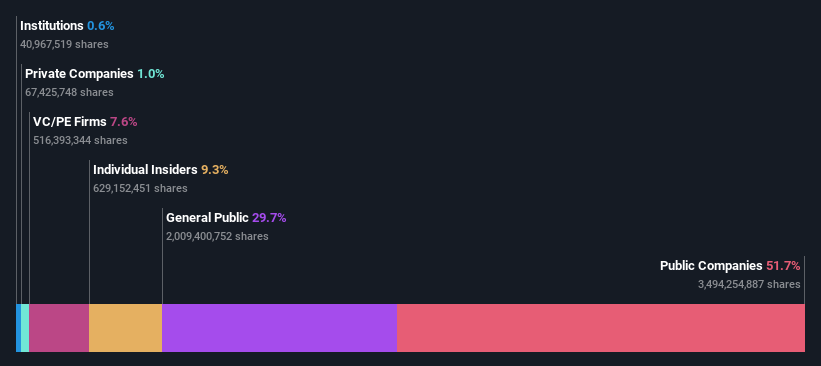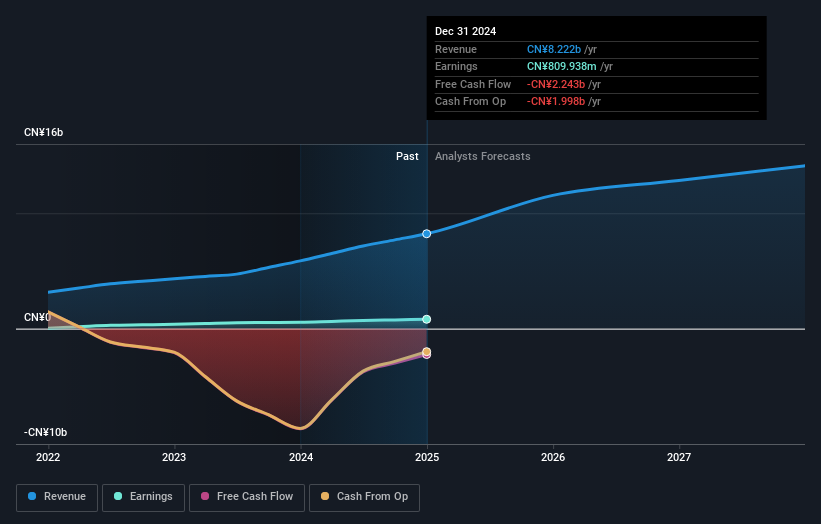- Hong Kong
- /
- Consumer Finance
- /
- SEHK:2858
Yixin Group Limited's (HKG:2858) biggest owners are public companies who got richer after stock soared 21% last week

Key Insights
- Yixin Group's significant public companies ownership suggests that the key decisions are influenced by shareholders from the larger public
- 52% of the company is held by a single shareholder (Tencent Holdings Limited)
- Using data from company's past performance alongside ownership research, one can better assess the future performance of a company
If you want to know who really controls Yixin Group Limited (HKG:2858), then you'll have to look at the makeup of its share registry. And the group that holds the biggest piece of the pie are public companies with 52% ownership. That is, the group stands to benefit the most if the stock rises (or lose the most if there is a downturn).
Clearly, public companies benefitted the most after the company's market cap rose by HK$2.4b last week.
In the chart below, we zoom in on the different ownership groups of Yixin Group.
See our latest analysis for Yixin Group

What Does The Lack Of Institutional Ownership Tell Us About Yixin Group?
We don't tend to see institutional investors holding stock of companies that are very risky, thinly traded, or very small. Though we do sometimes see large companies without institutions on the register, it's not particularly common.
There are multiple explanations for why institutions don't own a stock. The most common is that the company is too small relative to funds under management, so the institution does not bother to look closely at the company. Alternatively, there might be something about the company that has kept institutional investors away. Yixin Group's earnings and revenue track record (below) may not be compelling to institutional investors -- or they simply might not have looked at the business closely.

Yixin Group is not owned by hedge funds. Our data shows that Tencent Holdings Limited is the largest shareholder with 52% of shares outstanding. This essentially means that they have extensive influence, if not outright control, over the future of the corporation. Hammer Capital Investment Limited is the second largest shareholder owning 7.6% of common stock, and Lisa Leung holds about 3.7% of the company stock. Additionally, the company's CEO Xuan Zhang directly holds 3.5% of the total shares outstanding.
While studying institutional ownership for a company can add value to your research, it is also a good practice to research analyst recommendations to get a deeper understand of a stock's expected performance. While there is some analyst coverage, the company is probably not widely covered. So it could gain more attention, down the track.
Insider Ownership Of Yixin Group
The definition of an insider can differ slightly between different countries, but members of the board of directors always count. Company management run the business, but the CEO will answer to the board, even if he or she is a member of it.
Most consider insider ownership a positive because it can indicate the board is well aligned with other shareholders. However, on some occasions too much power is concentrated within this group.
Shareholders would probably be interested to learn that insiders own shares in Yixin Group Limited. It is a pretty big company, so it is generally a positive to see some potentially meaningful alignment. In this case, they own around HK$1.3b worth of shares (at current prices). It is good to see this level of investment by insiders. You can check here to see if those insiders have been buying recently.
General Public Ownership
With a 30% ownership, the general public, mostly comprising of individual investors, have some degree of sway over Yixin Group. While this size of ownership may not be enough to sway a policy decision in their favour, they can still make a collective impact on company policies.
Private Equity Ownership
Private equity firms hold a 7.6% stake in Yixin Group. This suggests they can be influential in key policy decisions. Sometimes we see private equity stick around for the long term, but generally speaking they have a shorter investment horizon and -- as the name suggests -- don't invest in public companies much. After some time they may look to sell and redeploy capital elsewhere.
Public Company Ownership
We can see that public companies hold 52% of the Yixin Group shares on issue. It's hard to say for sure but this suggests they have entwined business interests. This might be a strategic stake, so it's worth watching this space for changes in ownership.
Next Steps:
I find it very interesting to look at who exactly owns a company. But to truly gain insight, we need to consider other information, too. Take risks for example - Yixin Group has 3 warning signs (and 1 which is concerning) we think you should know about.
But ultimately it is the future, not the past, that will determine how well the owners of this business will do. Therefore we think it advisable to take a look at this free report showing whether analysts are predicting a brighter future.
NB: Figures in this article are calculated using data from the last twelve months, which refer to the 12-month period ending on the last date of the month the financial statement is dated. This may not be consistent with full year annual report figures.
New: Manage All Your Stock Portfolios in One Place
We've created the ultimate portfolio companion for stock investors, and it's free.
• Connect an unlimited number of Portfolios and see your total in one currency
• Be alerted to new Warning Signs or Risks via email or mobile
• Track the Fair Value of your stocks
Have feedback on this article? Concerned about the content? Get in touch with us directly. Alternatively, email editorial-team (at) simplywallst.com.
This article by Simply Wall St is general in nature. We provide commentary based on historical data and analyst forecasts only using an unbiased methodology and our articles are not intended to be financial advice. It does not constitute a recommendation to buy or sell any stock, and does not take account of your objectives, or your financial situation. We aim to bring you long-term focused analysis driven by fundamental data. Note that our analysis may not factor in the latest price-sensitive company announcements or qualitative material. Simply Wall St has no position in any stocks mentioned.
About SEHK:2858
Yixin Group
Operates as an online automobile finance transaction platform in China.
Proven track record low.
Similar Companies
Market Insights
Community Narratives


